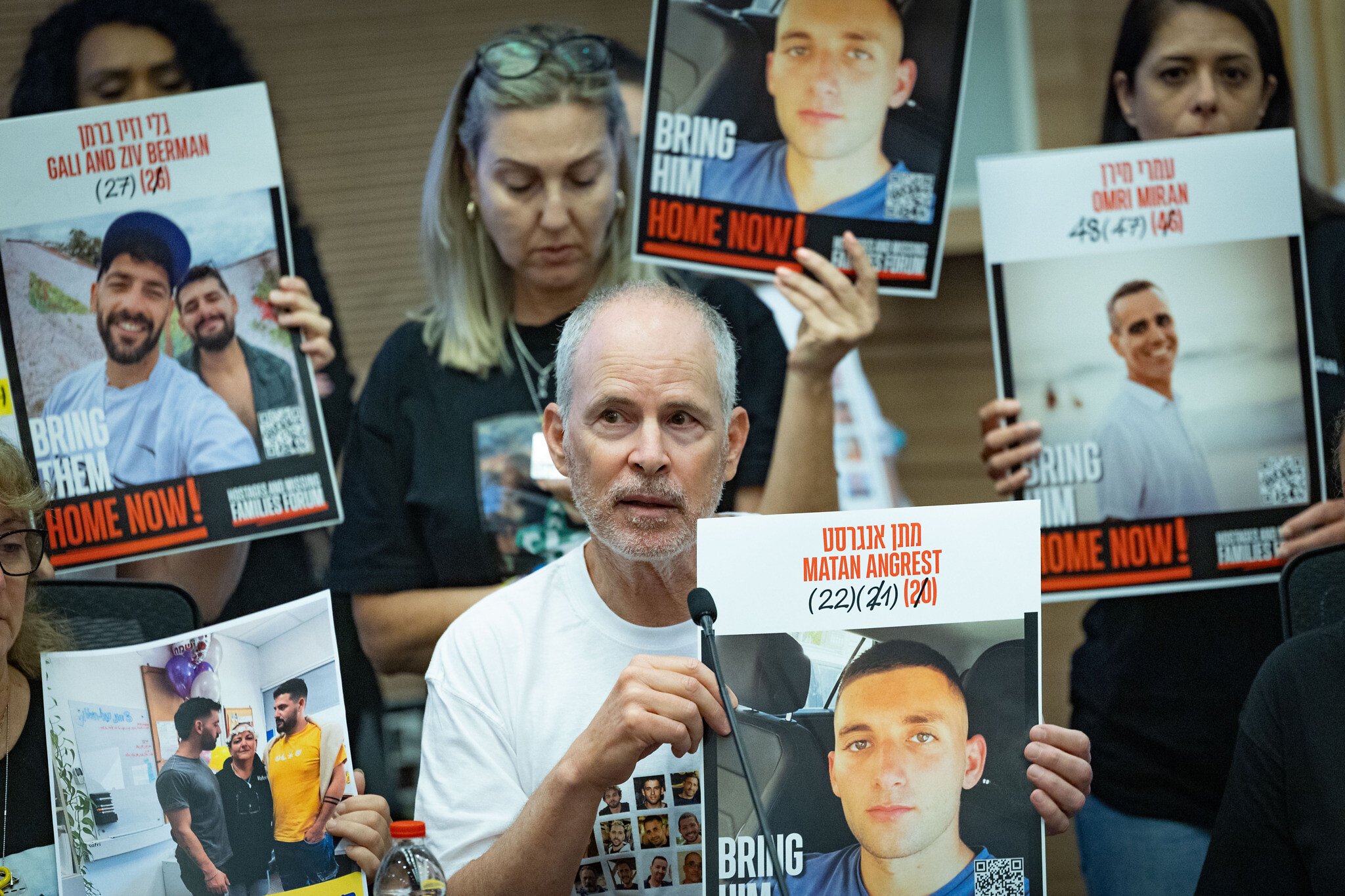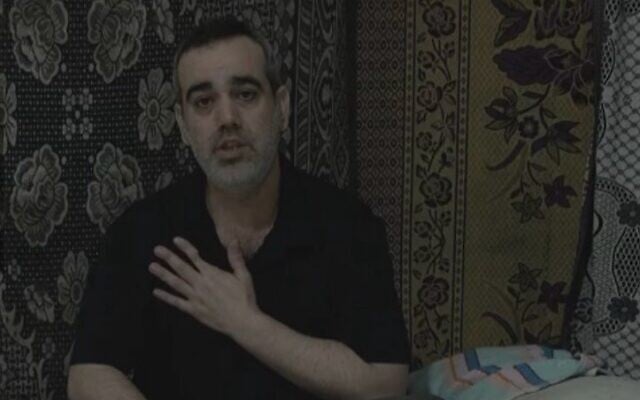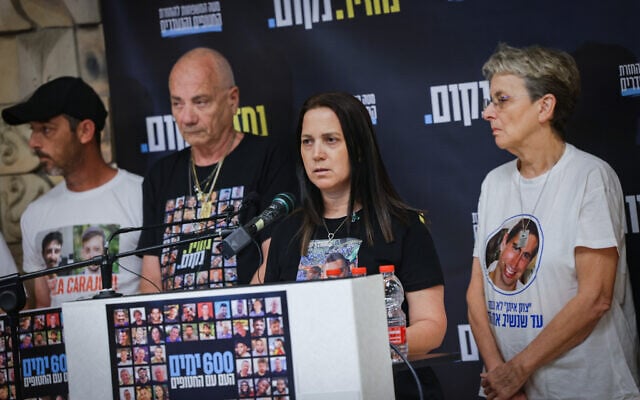



Released Israeli-American hostage Keith Siegel on Tuesday gave harrowing new testimony from his time in Hamas captivity, saying he witnessed severe violence and abuse of a female hostage he was held with.
“I was held together with Omri Miran. He has a wife and two small daughters. The separation from the family is excruciating in itself, and that’s without mentioning the violence and abuse,” Siegel said during a meeting of the Knesset Foreign Affairs and Defense Committee.
“They threatened to kill me several times,” he said. “They held a gun to my head, and I also saw hostages who experienced extremely severe violence and had their life threatened.”
“I witnessed them severely torturing a woman who was held hostage,” Seigel recounted. “They held a sharp rod to her forehead, they held a gun to her head.”
“These sights haunt me to this day and it’s getting harder and harder,” he said. “My body returned, but a part of me remained in Gaza, with Omri and Gali and Ziv Berman. They are suffering every minute there.”
The US-born Siegel was kidnapped from Kibbutz Kfar Aza during the October 7, 2023, Hamas attack along with his wife, Aviva. While she was freed in November 2023, he was not released until February 2025, during the last ceasefire and hostage release deal.

Siegel shared that he was also in captivity with soldier Matan Angrest, who is still a hostage in Gaza.
“He was seriously injured on October 7 and carries with him the injuries that have not healed to this day,” he said of Angrest. “We had to ask and beg to go to the bathroom. We experienced abuse and violence.”
“Matan was also in the tunnels, suffering from respiratory issues there. In order to keep him alive so that they could exchange him [in a hostage deal], they took him out of the tunnel.”
“Matan fought to retake my kibbutz on October 7 and we must fight to bring him and everyone else back,” Seigel implored the committee.
“There is a window of opportunity to save the hostages and the dead who could disappear if they don’t return,” he said, referring to the ongoing negotiations for a deal. “Every minute is critical. I call on [Prime Minister Benjamin] Netanyahu and [US President Donald] Trump to do everything they can and bring everyone home.”
Lishay Miran-Lavi, the wife of hostage Omri Miran, also spoke to the committee. “It was hard for me this morning. Five fighters. Five,” she said, referring to the five IDF soldiers who were killed in an explosion in northern Gaza on Monday night.
“If a ceasefire had gone into effect, we wouldn’t have had to light five more memorial candles,” she lamented. “The heart can’t take it anymore. For two weeks I’ve hardly been able to leave the house. It’s impossible. It’s impossible to take it anymore. We’re finished, the entire people of Israel are finished, I don’t want another soldier to fall.”
“I want Keith to rest already. He and Aviva deserve to rest. Everyone who came back deserves to rest and recover,” she said.

“They help every day, when we no longer have the strength. They are there to speak on our behalf, on their behalf,” Miran-Lavi continued. “I want everyone to look at the pictures. We are already in July. Omri is probably alone. Keith was the last to see him and that was last July. A year has passed since then.”
“Please end this terrible war, bring everyone back. Enough, so that we don’t have to light any more memorial candles,” she said, calling the number of soldiers killed in the war “unimaginable.”
“The ceasefire could have been agreed to long ago and could happen right now. Please. Members of the coalition and the opposition, you have the power to do it,” she pleaded.
Anat Angrest, the mother of hostage soldier Matan Angrest, said during the discussion: “This morning we saw the results of the continuation of the eternal war. Why is Matan there? Because he was seriously injured in IDF uniform. That’s what doomed him to stay there — fighting for the country.”
“An IDF soldier becomes a title that abandons him there. The State of Israel abandons IDF soldiers to die, to be injured, and to remain in captivity,” she said, referring to the fact that male soldiers are the last category of hostages to be negotiated for.
“Matan is still surviving the interrogations, but now they are talking about selection again,” she said, referring to the partial deal currently being negotiated that would leave half of the living hostages in captivity, with those returning home being chosen based on medical priority.

“How is the state going to determine who stays behind? Not a single soldier will be part of it? What comes before what? What kind of cruel selection. How do you choose 10?” she asked.
“It’s time for Keith and I to return those who were left behind,” Angrest continued. “There needs to be a state-sponsored deal that can bring everyone back. We were all promised that there would be phases two and three [of the previous deal], and now they’re saying again that they’ll start with half and then another half. It’s time to leverage the achievements and bring everyone back.”
The outline that is currently being negotiated would see a 60-day ceasefire during which Hamas would hand over 10 living and 18 dead hostages, Israeli forces would withdraw to a buffer zone along Gaza’s borders with Israel and Egypt, and significant amounts of aid would be brought in.
This deal would leave 10 living and 12 dead hostages in captivity and stops short of guaranteeing a permanent end to the war — a condition demanded by Hamas — but says negotiations for a permanent ceasefire and the release of the remaining hostages would take place during the 60 days.
The war began when Hamas invaded Israel on October 7, 2023, killing more than 1,200 people and taking 251 hostage. Since then, 140 hostages have been freed by Hamas, mostly during the two ceasefires. In addition, Hamas released the bodies of eight hostages, the IDF rescued eight hostages alive and recovered the bodies of 49 others from the Strip.
Hamas is still holding 50 hostages, with 28 of them confirmed dead by the IDF. Twenty of the hostages are believed by Israeli authorities to be alive, and there are grave concerns for the well-being of two others, Israeli officials have said.
